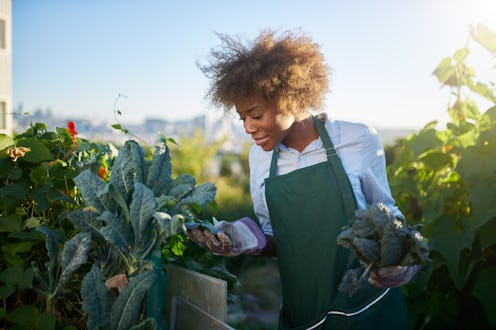(Living)
How To Start A Garden — Even If You Don't Have A Green Thumb

It's the season of outdoor activities: swimming, hosting BBQs, camping, and otherwise adventuring. But there's another popular one that remains elusive to many, and that's gardening. In concept, there's so much to love about growing your own herbs and veggies or cultivating your very own flower-filled respite where you can channel nervous energy and destress while giving yourself something productive to do with your hands (no phone required). That said, there's plenty of non-green-thumb-possessing folks out there who don't know how to start a garden, let alone produce a bounty of crops or a plethora of blossoms.
You may have already heard the news that keeping certain indoor plants in your home is actually good for your health, but gardening also offers its own benefits. Many people find the practice to be super meditative, and if you're trying to stay conscious about what you eat, there's no better way than growing your own produce. And if all this sounds good, but you don't know quite where to start, don't stress. Just because you weren't born with the gift of being super plant-savvy doesn't mean the garden of your dreams has to be out of reach.
With the help of Greg Salmeri, owner and president of Rolling Greens Nursery & Home in Los Angeles, you could be well on your way to rivaling the garden goddesses you've coveted on Instagram. With a few tips to put into practice — including knowing which plants are easy to care for and choosing between indoor and outdoor options — you could be growing something before you even know it — whether you've been blessed with a green thumb or not. Ahead, find his best advice for getting your garden off the ground (pun intended) ASAP.
Get Mother Nature's Help
Indoors versus outdoors? It's a common debate for the novice gardener. And for Salmeri's money, beginners should start outside for one main reason. "Plants naturally grow outdoors and so those new to gardening have the advantage of nature's helping hand," he says. "Of course, the outdoor garden is also exposed to all of nature's pitfalls so erratic weather, pests, and disease are some of the common battles faced by every gardener."
That said, if you do want to start with an indoor garden, he's got a few tips. "Locate plants by window and doors that open and monitor the watering carefully," he says. "Check plants weekly for water needs, being careful not to water a plant with moist soil and never allowing a plant to go so dry that the leaves wilt."
Start With A Foolproof Crop
Want to grow something you can (eventually) eat? There are a few options that are much more user-friendly than others, according to Salmeri. "The easiest herbs, fruits, and vegetables to grow are the ones most commonly seen at nurseries" he explains. "Mostly these plants are easy because they are bred to be somewhat foolproof — years of careful hybridizing has produced plants that are disease- and pest-resistant and tolerant of stress from low water and poor soil." Specifically, he recommends the ‘Early Girl’ tomato or ‘Mariachi’ pepper for almost guaranteed success.
Perennials For The Win
Perennial plants are those that grow for two years — or potentially longer. And according to Salmeri, first-time gardeners should opt for planting some of these so that you can experience their full cycle of life through the seasons and also look forward to at least one more in the future. "[They] typically grow quickly through the spring season, flower profusely in late spring or summer, go to seed in fall and die down (or need to be cut back) in the winter. Then they start all over again," he says. Some examples of easy-to-care-for perennials include peonies, Black-Eyed Susans, and chrysanthemums.
Every Plant Requires Water — But They All Have Different Needs
Salmeri explains that one common mistake made by novice gardeners is not knowing when and how to water their plants. For example, even drought-resistant plants like succulents still need to be occasionally watered. "It is more common to underwater plants outside and throw them into a stress-and-stunt situation than it is to overwater," he says. "Conversely it is more common to overwater a plant indoors, mainly due to the fact that a plant's processes are slowed indoors due to lower light situations." A good rule of thumb is to feel the soil first, but Salmeri notes that water meters are a great tool of for beginners who want to ensure success.